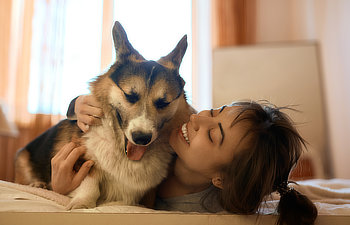
- Regular Dental Care: Establish a regular dental care routine for your dog. Brush their teeth with a dog-specific toothbrush and toothpaste approved by your veterinarian. Brushing helps remove plaque and tartar buildup, which can contribute to bad breath.
- Dental Chews and Toys: Provide dental chews and toys designed to promote oral health. Chewing on appropriate items, such as dental bones or toys with textured surfaces, can help remove plaque and freshen your dog’s breath. Choose products that are safe and appropriate for your dog’s size and chewing habits.
- Raw Bones and Rawhide Alternatives: Offer raw bones or rawhide alternatives for your dog to chew on. Chewing on raw bones can help scrape away plaque, but make sure to choose appropriate sizes and supervise your dog during chewing sessions to prevent choking or tooth damage.
- Fresh Water: Ensure your dog has access to fresh, clean water at all times. Staying hydrated helps maintain saliva production, which aids in washing away bacteria and reducing bad breath.
- Balanced Diet: Feed your dog a balanced and high-quality diet appropriate for their age and health condition. Poor nutrition can contribute to dental problems and bad breath. Consult with your veterinarian to determine the best diet for your dog.
- Parsley: Fresh parsley can help freshen your dog’s breath naturally. You can finely chop some parsley and add a small amount to their food. Parsley contains chlorophyll, which can help neutralize odor-causing compounds in the mouth.
- Coconut Oil: Adding a small amount of coconut oil to your dog’s food can help improve their breath. Coconut oil has antimicrobial properties that can help reduce bacteria in the mouth.
- Green Tea: Brew a weak, unsweetened green tea and let it cool. Use the cooled tea as a mouth rinse for your dog. Green tea contains natural antioxidants that can help reduce oral bacteria and freshen breath.
- Regular Veterinary Check-ups: Schedule regular dental check-ups with your veterinarian. They can perform professional dental cleanings and address any underlying dental issues that may be contributing to your dog’s bad breath.
- Avoid Table Scraps: Limit or avoid feeding your dog table scraps or human food, especially those that are known to cause bad breath in dogs, such as garlic, onions, and certain spices.
Remember, persistent bad breath could indicate an underlying dental or health issue, so it’s essential to consult with your veterinarian if the problem persists or worsens despite these natural remedies. They can provide a proper diagnosis and recommend additional treatments if necessary.
Posted on behalf of






